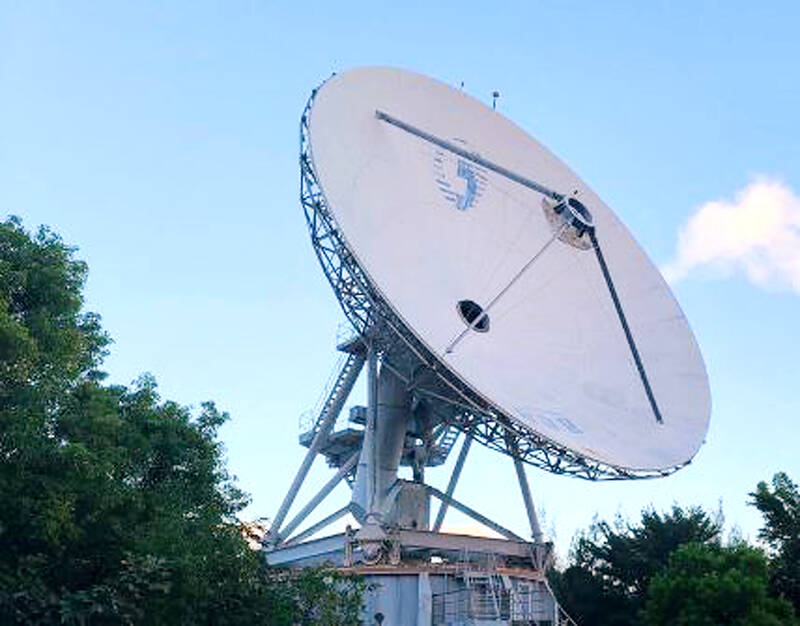Starting next month, companies can apply to deploy low-Earth-orbit (LEO) satellites using Taiwanese frequency bands on condition that they do not have any Chinese shareholders, the Ministry of Digital Affairs said on Saturday.
The ban on Chinese investors aims to ensure national security, as such satellites could serve as communication channels during wartime, said a ministry official, who spoke on condition of anonymity.
LEO satellites have also been used for reconnaissance, as evidenced by Ukraine’s use of SpaceX’s Starlink in its fight against Russian invaders, the official said.

Photo: CNA
Local and foreign companies that want to apply for an LEO satellite license first need to register a telecom in Taiwan whose chairs must be Taiwanese.
Any foreign shareholder in an applicant firm cannot directly own more than 49 percent of company shares, and their direct and indirect shares cannot exceed 60 percent.
Company management must sign a declaration about the firm’s shareholder structure, express its willingness to comply with Taiwan’s satellite communications regulations and guarantee that it would not engage in actions that could compromise Taiwan’s national security while operating LEO satellites, the rules say.
Asked whether the limits on foreign investment could be relaxed, as some companies, such as SpaceX, want to create single-shareholder firms to oversee the operation of LEO satellites overseas, the source said that many countries do not allow the operation model proposed by SpaceX, adding that a rule change would require amendments to the Telecommunications Management Act (電信管理法).
Applicant firms must have paid-in capital of NT$300 million (US$9.32 million).
The original requirement set by the National Communications Commission (NCC) called for paid-in capital of NT$500 million, but it was lowered after a request by the representatives of some listed firms, the official said.
The capital threshold and the ban on Chinese investment were introduced by the ministry after it took over the task of managing LEO satellite operators from the NCC, the official added.
The draft regulations seek to establish four frequency bands for LEO satellite operators, they said, adding that licensing would be based on reviews of credentials rather than an auction.
A model for LEO satellite applications in Taiwan could involve local telecoms partnering with foreign companies to address the needs of customers in the private and public sectors, such as the government, which might want to prepare for emergency situations in which conventional means of communication fail, a telecom firm executive has said.
Another possible business model would be for local telecoms to utilize LEO satellite services by foreign companies to expand their coverage, they added.
However, an executive from another telecom expressed doubts over the profitability of LEO satellites in Taiwan.
While traditional satellites are deployed at altitudes of about 36,000km, LEO satellites are typically deployed at altitudes of 2,000km or lower, thus having wider coverage and less delay, effectively complementing the scope of traditional satellites in remote areas and confined spaces such as in mountains, deserts, oilfields, and for ships or aircraft, said the second executive, who also spoke on condition of anonymity.
People could use LEO satellites to stream videos or play online games, albeit at higher costs than Wi-Fi, whose affordable prices and high penetration rate in Taiwan mean that LEO satellites are not likely to receive an enthusiastic reception from the public, except for people who have to spend long hours on aircraft or ships, they said.

A small number of Taiwanese this year lost their citizenship rights after traveling in China and obtaining a one-time Chinese passport to cross the border into Russia, a source said today. The people signed up through Chinese travel agencies for tours of neighboring Russia with companies claiming they could obtain Russian visas and fast-track border clearance, the source said on condition of anonymity. The travelers were actually issued one-time-use Chinese passports, they said. Taiwanese are prohibited from holding a Chinese passport or household registration. If found to have a Chinese ID, they may lose their resident status under Article 9-1

Taiwanese were praised for their composure after a video filmed by Taiwanese tourists capturing the moment a magnitude 7.5 earthquake struck Japan’s Aomori Prefecture went viral on social media. The video shows a hotel room shaking violently amid Monday’s quake, with objects falling to the ground. Two Taiwanese began filming with their mobile phones, while two others held the sides of a TV to prevent it from falling. When the shaking stopped, the pair calmly took down the TV and laid it flat on a tatami mat, the video shows. The video also captured the group talking about the safety of their companions bathing

PROBLEMATIC APP: Citing more than 1,000 fraud cases, the government is taking the app down for a year, but opposition voices are calling it censorship Chinese Nationalist Party (KMT) Chairwoman Cheng Li-wun (鄭麗文) yesterday decried a government plan to suspend access to Chinese social media platform Xiaohongshu (小紅書) for one year as censorship, while the Presidential Office backed the plan. The Ministry of the Interior on Thursday cited security risks and accusations that the Instagram-like app, known as Rednote in English, had figured in more than 1,700 fraud cases since last year. The company, which has about 3 million users in Taiwan, has not yet responded to requests for comment. “Many people online are already asking ‘How to climb over the firewall to access Xiaohongshu,’” Cheng posted on

A classified Pentagon-produced, multiyear assessment — the Overmatch brief — highlighted unreported Chinese capabilities to destroy US military assets and identified US supply chain choke points, painting a disturbing picture of waning US military might, a New York Times editorial published on Monday said. US Secretary of Defense Pete Hegseth’s comments in November last year that “we lose every time” in Pentagon-conducted war games pitting the US against China further highlighted the uncertainty about the US’ capability to intervene in the event of a Chinese invasion of Taiwan. “It shows the Pentagon’s overreliance on expensive, vulnerable weapons as adversaries field cheap, technologically